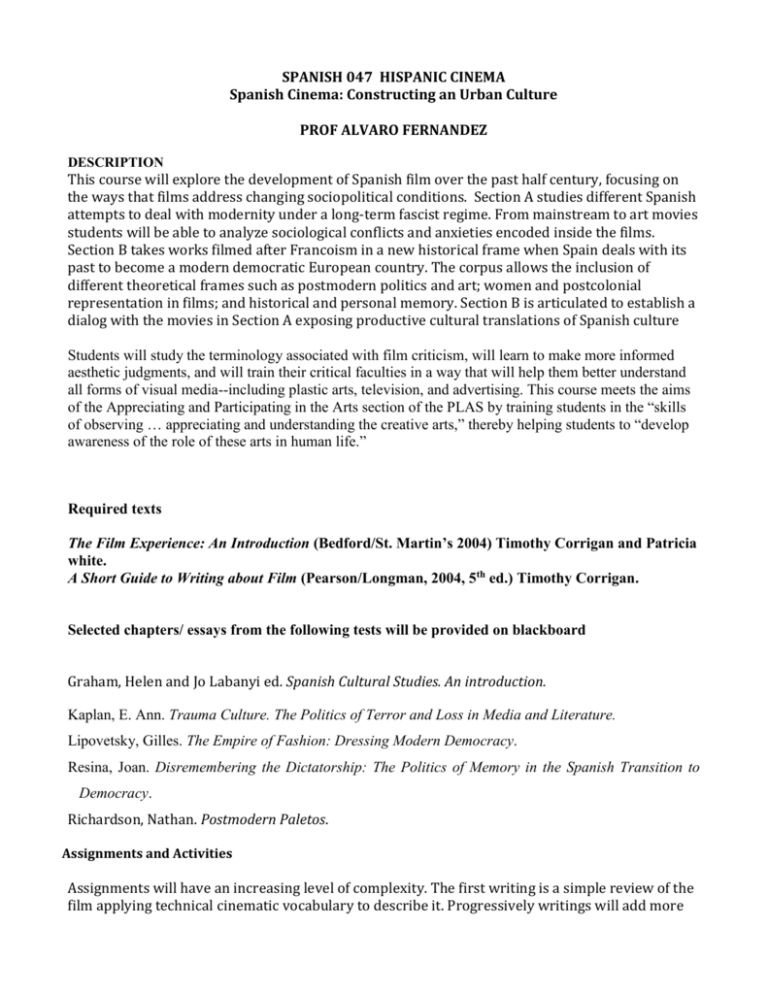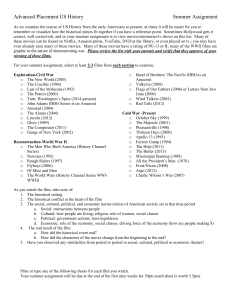
SPANISH 047 HISPANIC CINEMA
Spanish Cinema: Constructing an Urban Culture
PROF ALVARO FERNANDEZ
DESCRIPTION
This course will explore the development of Spanish film over the past half century, focusing on
the ways that films address changing sociopolitical conditions. Section A studies different Spanish
attempts to deal with modernity under a long-term fascist regime. From mainstream to art movies
students will be able to analyze sociological conflicts and anxieties encoded inside the films.
Section B takes works filmed after Francoism in a new historical frame when Spain deals with its
past to become a modern democratic European country. The corpus allows the inclusion of
different theoretical frames such as postmodern politics and art; women and postcolonial
representation in films; and historical and personal memory. Section B is articulated to establish a
dialog with the movies in Section A exposing productive cultural translations of Spanish culture
Students will study the terminology associated with film criticism, will learn to make more informed
aesthetic judgments, and will train their critical faculties in a way that will help them better understand
all forms of visual media--including plastic arts, television, and advertising. This course meets the aims
of the Appreciating and Participating in the Arts section of the PLAS by training students in the “skills
of observing … appreciating and understanding the creative arts,” thereby helping students to “develop
awareness of the role of these arts in human life.”
Required texts
The Film Experience: An Introduction (Bedford/St. Martin’s 2004) Timothy Corrigan and Patricia
white.
A Short Guide to Writing about Film (Pearson/Longman, 2004, 5th ed.) Timothy Corrigan.
Selected chapters/ essays from the following tests will be provided on blackboard
Graham, Helen and Jo Labanyi ed. Spanish Cultural Studies. An introduction.
Kaplan, E. Ann. Trauma Culture. The Politics of Terror and Loss in Media and Literature.
Lipovetsky, Gilles. The Empire of Fashion: Dressing Modern Democracy.
Resina, Joan. Disremembering the Dictatorship: The Politics of Memory in the Spanish Transition to
Democracy.
Richardson, Nathan. Postmodern Paletos.
Assignments and Activities
Assignments will have an increasing level of complexity. The first writing is a simple review of the
film applying technical cinematic vocabulary to describe it. Progressively writings will add more
sophisticated approaches using different theoretical frameworks. From structural methodologies
that clearly distinguish analytical levels inside the film, to sociological relations that will relate the
selected movies to one another and insert them in a complex historical context; the course
proposes a parallel training in analytical methods and a deep approach to Spanish contemporary
cinema and culture.
. One individual response paper for each movie. Approaches will be conducted following a
progression from immanent to intertextual analysis.
. One paper (3-5 pages) that considers two movies linked by a common problem previously
discussed in class.
. One paper (3-5 pages) that analyses a movie using selected bibliography to guide or discuss the
approach.
. Midterm and Final Exam will address and expose how the movies put into play cultural
tendencies studied and discussed in class.
A. Urban Culture and Francoisnm
1. Paletos’ Cinema (I). Turism & National Identity (Pedro Lazaga - El turismo es un gran invento)
2. Paletos’ Cinema (II). Urban Utopias (Pedro Lazaga - La ciudad no es para mi)
3. Avant Garde Cinema & Francoism (I). Images without (explicit) words (Carlos Saura - Peppermint
Frappé)
4. Avant Garde Cinema & Francoism (II). Women in love (Jaime de Armiñán - Mi querida señorita)
Midterm exam
First Paper
B. Constructing a European identity
5. Postmodern Paletos (Pedro Almodóvar - Mujeres al borde de un ataque de nervios)
6. Women at the verge of a violent attack (Icíar Bollaín - Flores de otro mundo)
7. Happy Postmodernity (Pedro Almodóvar - Todo sobre mi madre)
8. Reading Postmodernity (Ramón Salazar - 20 centímetros)
9. Unfinished business. (Agustí Villalonga - Tras el cristal; David Trueba - Soldados de Salamina; Álex
de la Iglesia - La comunidad; Jaume Balagueró - Darkness)
Second Paper
Final Exam
SPAN 047: Hispanic Film
Latin American Cinema
Professor Iliana Alcántar
Course description:
This course is designed to introduce the students to the cinematic work of a number of Latin American
film artists, and to develop a more detailed and creative reception of each film. In particular, this class
examines the use of cinema in a particular time period—the sixties through the present—to illustrate the
abuse of power by the State and by military dictatorships, and the reactions of oppositional groups in
Latin America.
Students will study the terminology associated with film criticism, will learn to make more informed
aesthetic judgments, and will train their critical faculties in a way that will help them better understand
all forms of visual media--including plastic arts, television, and advertising. This course meets the aims
of the Appreciating and Participating in the Arts section of the PLAS by training students in the “skills
of observing … appreciating and understanding the creative arts,” thereby helping students to “develop
awareness of the role of these arts in human life.”
In addition to class time, there will be weekly readings and screenings. Students will be responsible for
viewing films for the class on their own time previous to class discussion.
Course Objectives:
Although most of us enjoy watching films, few of us view film analytically. For this reason, one
of the main objectives of the class is to encourage students to approach films not only as
entertainment but also as an object of analysis.
Cultivate a deep-rooted understanding of filmmaking in Latin America and of the relationship of
Latin American film to Hollywood and European traditions.
Gain an understanding of these films’ integral relationship to the Latin American social,
economic, and political context.
The course aims to integrate theory and practice; aside from the midterm and final exams,
students will work on writing assignments in which they apply the concepts learned throughout
the course.
Writing assignments:
Screening notebook. You will keep a notebook and take notes on each assigned film. I suggest that you
make notes both during and after the screening. If you take notes during the screening and write them up
immediately after you see a film, you will get more out of class discussions, and your writing about the
films will be more substantive.
First paper: 3-5 pages. For this first assignment, you will be writing a film critique on the film you
have selected. Because you will be writing criticism and not reviews, your essays should not summarize
the plot. When writing film criticism, assume the reader has seen the film. Criticism means developing
an argument and supporting it with evidence from the film, not delivering opinion. Remember that
opinion is present (the critique implies that the film succeeds in an important task through formally
appropriate means), but opinion only prompts or motivates the criticism; it does not begin and end it.
There is no one right interpretation, there are, however, better interpretations than others. Make sure the
film supports your reading of it. If, for example, there is evidence that contradicts your interpretation,
you must account for it. Although you are welcome to make connections to previous screened film, as
well as make references to other movies, the purpose of your paper is not to compare nor contrast films.
See handout for more guidance on writing your critique.
Second paper: 3-5 pages. For the final paper, you will write an essay on one of the films you have
screened for class. The paper should have a clear and narrow thesis. You should focus on an aspect of
the film that interests you. Stay away from an overall evaluation of the film. Ask yourself what interests
you about the film, what broader issues you can relate the film to, and how you can develop a coherent
argument. For instance, rather than writing a paper explaining why Memories of Underdevelopment is a
masterpiece, you can focus on a stylistic aspect such as cinematography or the long take, a narrative
aspect such as the use of ellipses or the voice-over narration, or a cultural aspect such as the
representation of the bourgeoisie or of masculinity. Organize the paper according to the logic of your
argument. Don’t let the plot of the film dictate how you organize your paper. The paper should include
two academic sources. These sources do not have to be about the film. These essays or books may be
about the topic you are writing about. For instance, if you are writing an essay about the use of torture in
Garage Olimpo, you could consult about torture practices in dictatorship regimes.
Your essay should also include a close analysis of at least one scene from the film. Make sure that you
integrate the scene into the argument. Be sure, however, that it fits into the overall argument of the
paper.
Required texts
The Film Experience: An Introduction (Bedford/St. Martin’s 2004) Timothy Corrigan and Patricia
white.
A Short Guide to Writing about Film (Pearson/Longman, 2004, 5th ed.) Timothy Corrigan.
Selections from:
Contemporary Cinema of Latin America. (Continuum International Publishing Group, 2003) Deborah
Shaw.
Cuban Cinema. (Minnesota UP, 2004) Michael Chanan.
Magical Reels: A History of Cinema in Latin America. (Verso, 2000) John King.
Mediating Two Worlds: Cinematic Encounters in the Americas. (London, British Film Institute, 1993)
John King, Ana M. López, and Manuel Alvarado.
The New Latin American Cinema. A Continental Project. (Austin, Texas UP, 1993) Susan Pick.
New Latin American Cinema: Studies of National Cinemas. (Wayne State UP, 1997) Michael T. Martin.
New Latin American Cinema: Theory, Practices, and Transcontinental Articulations. (Wayne State UP,
1997) Michael T. Martin.
Class program: Class meetings will intertwine discussion of films and readings.
I. Memories of the Revolution:
Week 1: Film in Latin America: A postcolonial approach, or, can the subaltern speak?
Week 2: I am Cuba (1964) or Motorcycle Diaries (2004)
Week 3: Memories of Underdevelopment (1968)
Week 4: Strawberry and Chocolate (1994)
II. Repression and violence
Week 5: The Official Story (1983); first paper due
Week 6: Night of the Pencils (1986) or Garage Olimpo (1999) or Chronicle of an Escape (2006)
Week 7: In the Time of the Butterflies (2001)
Week 8: Midterm exam
III. The child’s gaze
Week 10: Kamchatka (2002)
Week 11: Machuca (2004)
Week 12: The Year My Parents Went on Vacation (2006)
Week 13: Postcards from Leningrad (2007)
Week 14: Recapitulation, conclusions; second paper due







